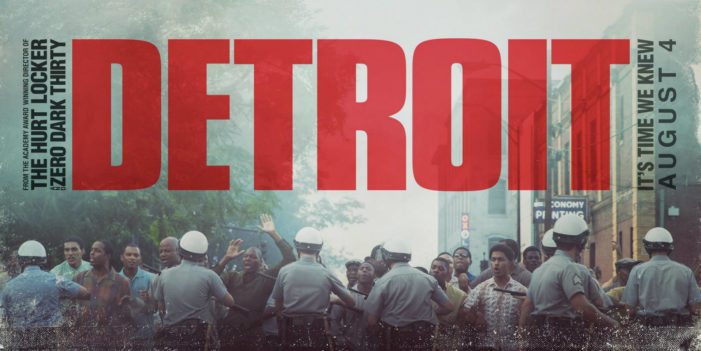This was not a day for Hollywood.
Fifty years later, it remained – for me – a day of anger, hurt, resentment and tragedy. I wasn’t here to witness Detroit’s deadly, devastating 1967 uprising, which began July 23 and lasted for several unforgettable days, but I wear its scars. By riding past the crumbling landmarks that still line areas around the former 12th Street and through hearing the stories of my family members, mentors and local historians, I’ve allowed the fiery legacy that nearly burned down the city to become part of me.

My godsister Robyn called me Sunday, remembering how a man across the street from her house sat for days with a shotgun across his lap, keeping vigil to help stop the trouble that overwhelmed police and drew military presence into city streets from visiting Robyn’s block. Just a little girl, she found it odd to see her grandfather Harold Ussery, one of the city’s first black police officers, visiting their house while still in uniform. Even stranger, though she didn’t note it at the time, her dad Roger Ussery was conspicuously absent, instead of close to the family he’d have given his life for. Robyn learned later that, in the oddest twist of fate, Roger, an honest man and one of my personal heroes, had found himself in the wrong place at the wrong time: The thoughtful school teacher and son of a distinguished cop was arrested, having wrongly been presumed a looter. Thank God, he would make it home to his family, with a clear name and living to tell about the experience.
It’s commendable that a feature film works hard to present significant truths. I loathe its title, but Detroit is a respectable model of how Hollywood can depict a community’s story, even when the community differs about the story itself.
No, this past Sunday was not for Hollywood. I’d heard enough stories on my own. In fact, I’d even helped tell some of the stories, like that of Yvonne and Jerry Olshove, whose father was the only policeman killed that week, so hot it scorched with arson and emotion. As a producer of the documentary Summer ’67: Finding the Lost, which aired Tuesday, July 25, 2017 on PBS Channel 56 in Detroit, I helped tell stories like that of 4-year-old Tanya Blanding. The most innocent of 43 known victims in the uprising, a medical examiner’s report proves what I once found hard to believe – she was shot through the back while lying on the floor to take cover from the chaos outside. A National Guardsman’s bullet had been carelessly and indiscriminately fired through the ceiling of the apartment under hers. If not for a bloody brew of institutionalized racism, concentrated poverty around 12th Street, and other often-ignored, underlying factors, little Tanya would likely be a healthy 54-year-old woman today.

What use did I have for Hollywood on July 23? I hated the very name of director Kathryn Bigelow’s Detroit, which chronicles the Algiers Motel deaths of that week in 1967. It’s too broad a stroke, too artistically irresponsible, to make a movie about our city’s most horrific chapter and label it after the city itself. More insultingly, it wasn’t even filmed in Detroit! Yet, slightly depressed that it made it to theaters at all, I forced myself to attend Detroit’s Sunday screening at the Bel Air, prepared to hate every second of it.
There’s a reason why we shouldn’t judge things by appearance.
From the film’s opening, a creative animated sequence tracing the bubbling cauldron of 12th Street in 1967 back to the Great Migration of blacks’ population boom, more than 20 years earlier, Bigelow paints a fair picture. Not only is she thought-provoking, even more than a few local talking heads I’ve heard dismissing the eruption as a riot instead of a rebellion, but Bigelow is probative. Her story doesn’t apologize for opportunists – both black and white – who used the tidal wave of confusion to steal expensive clothes and appliances for themselves, but it does draw a clear contrast in Detroit’s class status, akin to what exists today. Bigelow’s narrative raises a question I’ve raised: If one has the same economic advantage as another, why does one have reason to steal? Rebellions can’t be strictly defined by a mindset of social consciousness. While not a lawful trait, taking what wasn’t previously available has historically characterized groups that rebel.
Most impressive is the respectful care given to factual research about the Algiers incident, in which three unarmed teenagers were killed by authorities, and the resulting legal proceedings that resulted in no jail time by responsible cops. Unfortunately, Detroit suffers from an agonizing hour or so, under the weight of scene after scene that lags on as it chronicles the mental torture and racially motivated deaths at Algiers, a seedy dive formerly in the Virginia Park area. Actor Will Poulter is a powerhouse as Krauss, the chilling terrorist of a cop, but the motel sequence lingers about 20 minutes too long.
Absent from the film are heroes like too-little-known trailblazer Mary Jarrett-Jackson, a Detroit Police forensics investigator whose evidence would have surely helped convict her cop colleagues, were it not for racial politics. While researching Summer .67 I interviewed Jarrett-Jackson, a one-time deputy chief, who broke barriers as a black woman examining crime scenes as far back as 1958. Calling the Algiers episode an outright murder case, she shared that the bodies had been moved when she arrived, a violation of any standard investigative policy. Voices like Jarrett-Jackson’s would have given Detroit immense credibility as a historical drama.
Still, it’s commendable that a feature film works hard to present significant truths. I loathe its title, but Detroit is a respectable model of how Hollywood can depict a community’s story, even when the community differs about the story itself.


